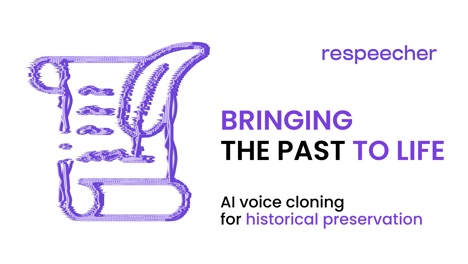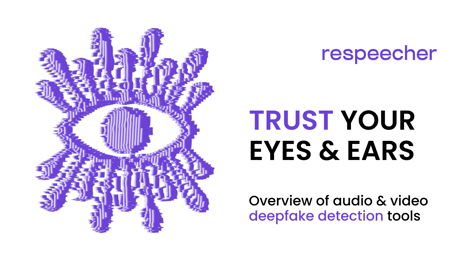Personalizing Brand Messages with Text-to-Speech Synthesis: Strategies for Marketers

Today, brands are challenged to establish meaningful connections with their audience by delivering tailored messages that resonate personally. As consumers increasingly seek authenticity and relevance in their content, brands must adapt their marketing strategies accordingly.
According to recent studies, personalized marketing messages can lead to significantly higher conversion rates and customer satisfaction levels than generic campaigns. In response, marketers are exploring innovative technologies that enable them to customize their communication strategies at scale. Text-to-speech (TTS) synthesis allows marketers to convert written text into spoken words, creating dynamic audio content and brand AI voices tailored to individual preferences and demographics.
TTS in Marketing
Text-to-speech technology is a versatile tool for crafting unique brand voices and messaging in voice cloning use cases for advertising while ensuring a consistent brand presence across multiple platforms. Understanding how TTS functions and its potential in marketing is crucial for effectively leveraging its benefits.
Text to speech technology converts written text into spoken words, replicating human speech through synthetic AI voices. The process of AI speech synthesis involves several stages:
- Text Processing: The written text undergoes linguistic analysis, including phonetic and prosodic features, to ensure accurate pronunciation and intonation.
- Speech Synthesis: Based on the analyzed text, the TTS system generates speech signals using algorithms that mimic human speech patterns, including pitch, rhythm, and stress.
- Voice Rendering: The synthesized speech signals are converted into audible sound waves, producing natural-sounding speech output.
TTS allows marketers to tailor brand messaging by selecting specific voices, accents, and speech styles that align with their brand identity and target audience preferences. For global brands catering to diverse markets, text-to-speech synthesis enables localization of messaging by delivering content in multiple languages and regional accents.
This ensures brand communication resonates with local audiences, fostering deeper connections and cultural relevance. Finally, by dynamically generating audio content based on user data and preferences, TTS facilitates personalized marketing messages.
TTS as a Solution for Consistent Brand Presence
Omni-channel Marketing: TTS enables consistent brand messaging across various platforms, including websites, mobile apps, social media, and voice-enabled devices.
Brand Guidelines Compliance: With text-to-speech, marketers can maintain adherence to brand guidelines and standards across different communication channels.
Scalability and Efficiency: TTS offers scalability and efficiency in content creation, allowing marketers to generate audio content quickly and cost-effectively.
Customized Communication with Text to Speech
Text-to-speech technology empowers marketers to deliver tailored messages that match both the brand tone and tone of voice and the specific demographics of their target audience. Here's how TTS facilitates customized communication:
Brand Tone Matching
TTS offers a wide selection of custom AI voices with varying tones, accents, and styles, allowing marketers to select the most suitable voice to represent their brand personality accurately.
Customer Demographics Alignment
Marketers can leverage TTS to generate personalized messages that resonate with specific audience segments by analyzing customer demographics and preferences.
Adaptive Messaging
TTS enables adaptive messaging strategies by integrating customer relationship management (CRM) systems and data analytics platforms.
Multilingual Communication
Text to speech technology supports various languages, allowing marketers to reach global audiences effectively. Brands can deploy multilingual TTS solutions to deliver consistent messaging across diverse markets and cater to their international customers' language preferences.
In addition to supporting multiple languages, TTS offers the flexibility to adapt to regional dialects and accents, further enhancing message resonance and authenticity. By selecting specific regional voices or customizing pronunciation parameters, marketers can localize their messaging to reflect the linguistic nuances of different regions within a target market.
Advantages for Marketers and Consumers
Text-to-speech technology offers many benefits for both marketers and consumers, revolutionizing how brands communicate and engage with their audience. Here are some of the key advantages:
For Marketers:
- Engaging Auditory Content: TTS enables marketers to deliver engaging auditory content that captures attention and resonates with consumers in an increasingly audio-centric digital landscape.
- Inclusive Marketing: It plays a crucial role in inclusive marketing by ensuring accessibility for individuals with visual impairments or reading difficulties.
- Efficiency in Scaling Marketing Efforts: Text-to-speech streamlines content creation processes, allowing marketers to scale their marketing efforts efficiently without compromising quality.
For Consumers:
- Enhanced Accessibility: TTS technology enhances accessibility for consumers by providing alternative means of consuming content, particularly for those with visual impairments or literacy challenges.
- Convenient and On-the-Go Consumption: Text to speech allows consumers to consume content conveniently while on the go, whether commuting, exercising, or multitasking.
- Personalized and Relevant Experiences: It facilitates customized consumer experiences by delivering tailored messages that align with their preferences, demographics, and behavior.
Case Studies
In 2020, Mondelēz International, Ogilvy, and Wavemaker used speech synthesis to create a unique video where the movie star Shahrukh Khan (also known as SRK) represented local sellers, which seems impossible given the size and number of stores and the scale of SRK's celebrity. In short, AI systems use machine learning to create a target model of an actor's appearance and voice to generate unlimited customized content, as if the actor themselves took part in this. Read the full case study about the revolutionary ad campaign for the Idian market.
Another example is the story of a popular YouTube channel run by two friends — Josh and Ollie. One of them secretly wrote the other's autobiography and voiced it himself. But the main idea was to give this story the voice of its hero with the help of Respeecher. The book was around 2,5 hours long and involved lines with different characters. This meant that special attention had to be paid to maintaining specific timbres, voice tones, cadences, emotional accents, etc. The result was a completely natural-sounding audio track. Read the full case study about how Respeecher gives Youtubers new ways to amaze their audience.
Conclusion
Text-to-speech synthesis enables marketers to craft unique brand voices, tailor messaging to specific demographics, and ensure consistency across various platforms. It also facilitates inclusivity and accessibility, allowing brands to reach a broader audience and demonstrate their commitment to diversity.
With TTS, marketers can stay ahead of the curve, delivering personalized experiences that resonate with their audience and drive customer engagement and loyalty. Innovative solutions, such as Respeecher Voice Marketplace, can unlock new possibilities for innovation and personalization in brand messaging. Try it today to elevate your marketing strategies and deliver memorable experiences to your audience.
FAQ
Text-to-speech (TTS) technology converts written text into spoken words using AI voices and speech synthesis. It replicates human speech patterns, including pitch and rhythm, to create natural-sounding audio, enhancing communication in various applications like personalized marketing and audience engagement.
TTS enables personalized marketing by creating custom AI voices that match the brand tone and resonate with specific demographics. By analyzing customer data, marketers can generate tailored messages, delivering content in the most engaging and relevant way for each individual, enhancing audience engagement.
TTS supports multilingual communication, allowing global brands to adapt messaging for diverse markets. It provides flexibility with regional accents and voice cloning, ensuring content resonates with local audiences while maintaining a consistent brand tone across all platforms.
TTS enhances inclusivity by providing accessible content for individuals with visual impairments or literacy challenges. It ensures that all consumers can engage with marketing messages, creating a more inclusive experience for everyone, regardless of their language or accessibility needs.
Respeecher innovates TTS by enabling voice cloning technology that replicates natural-sounding AI voices. It allows brands to create highly personalized content, maintaining brand tone consistency across various channels, and producing dynamic adaptive messaging that resonates with specific audiences.
Glossary
Text-to-speech (TTS)
AI voices
Speech synthesis
Multilingual communication
Adaptive messaging

- voice synthesis
- AI voice synthesis
- text-to-speech (TTS) synthesis
- digital marketing
- AI voice
- AI voices
- AI Ethics
- text to speech
- brand AI voice
- custom AI voice
- AI speech synthesis
- brand voice
- brand tone of voice
- accent generator
- customer engagement
- brand identity
- voice personalization
- accent conversion
- brand messages with text-to-speech





